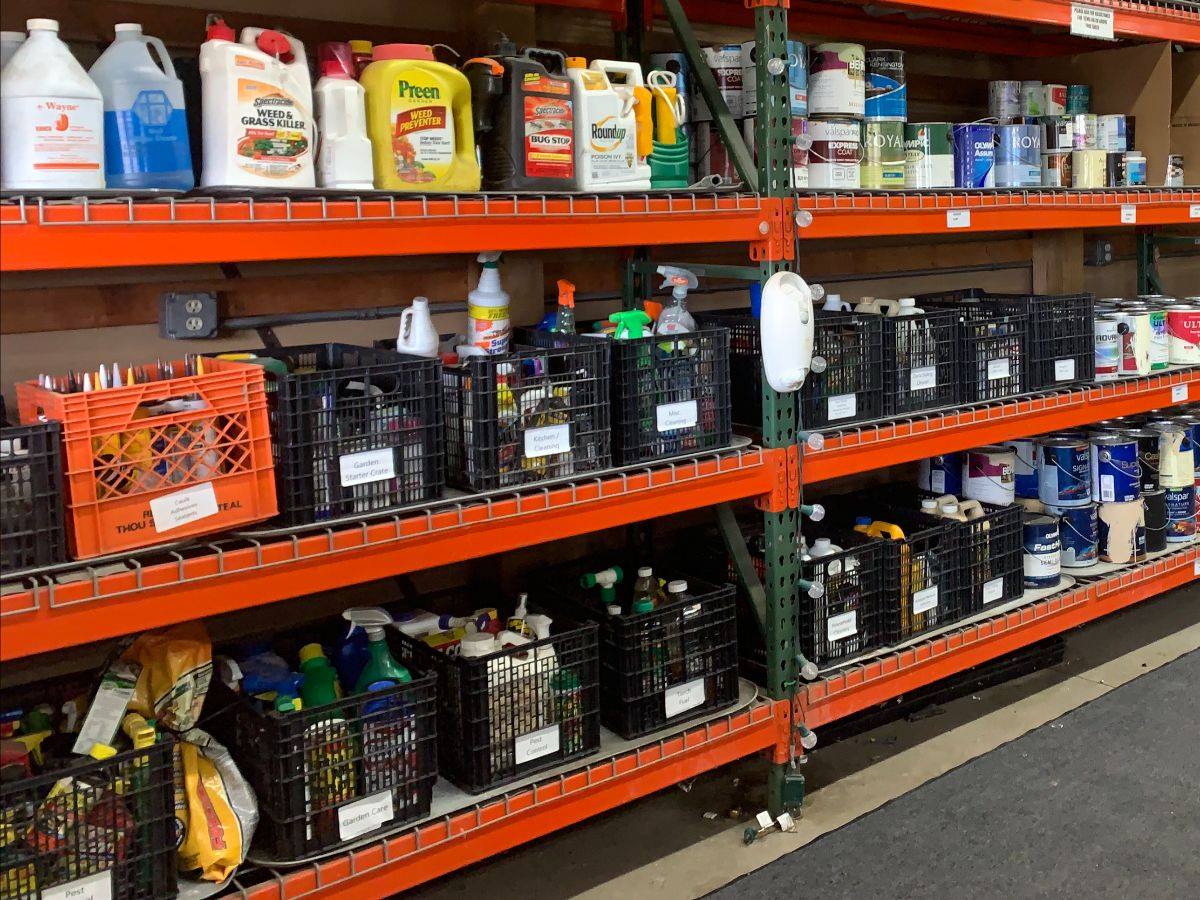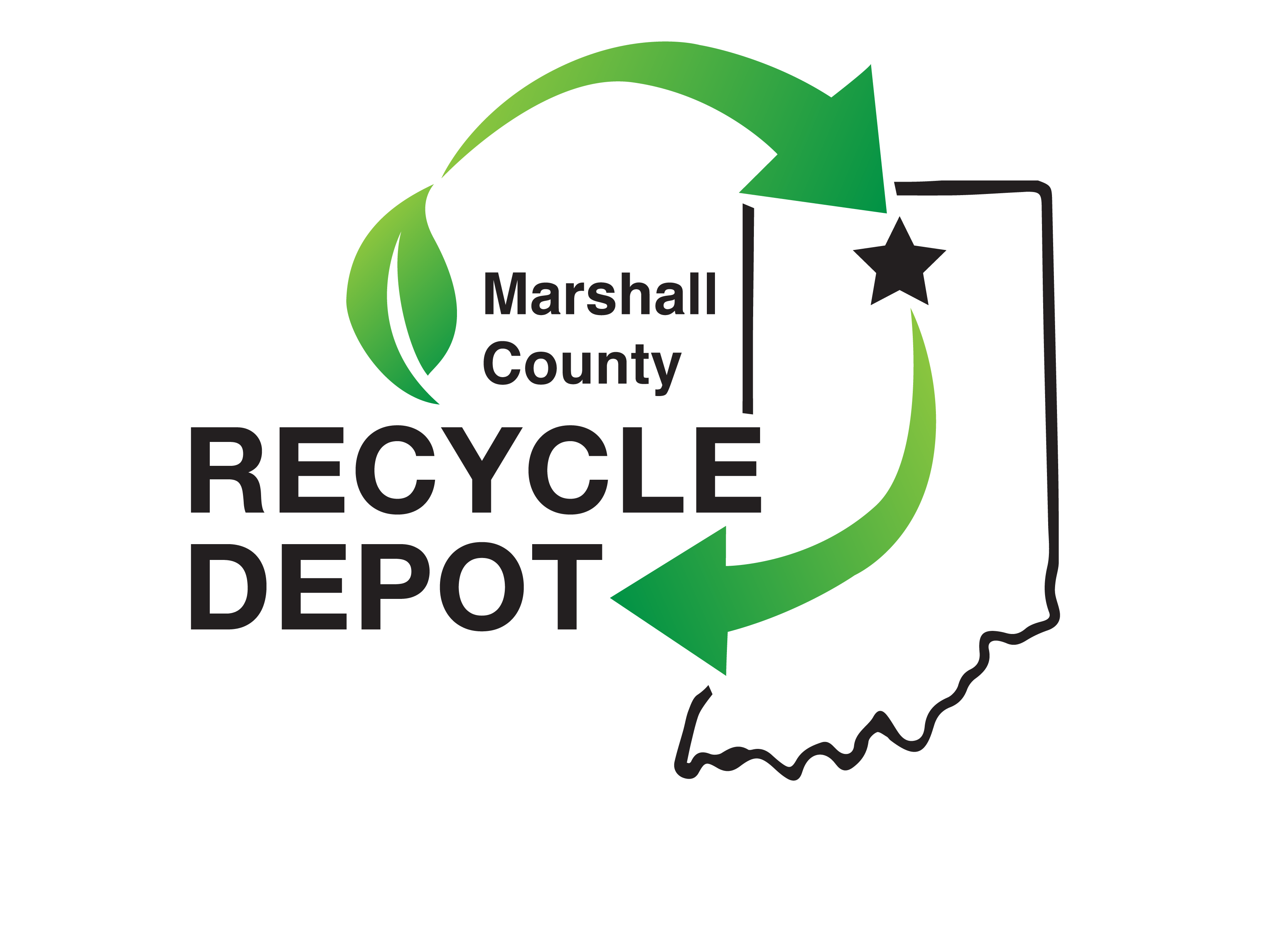Why should I recycle? Look beyond the bin!
Recycling saves energy.
Recycling one aluminum can saves enough energy to run a 100 watt light bulb for 20 hours, a computer for 3 hours, and a TV for 2 hours!
Recycling recovers natural resources.
Recycling a ton of newspapers saves 17 trees, plus 462 gallons of oil. A 2-liter soda bottle can be recycled into a T-shirt, a park bench, carpeting, or another plastic bottle.
Recycling generates less pollution.
When the paper industry makes paper from recycled materials, they reduce the pollution they generate by 95 percent.
Recycling conserves landfill space.
In Marshall County, we produce enough trash annually to cover 37 acres 3 feet deep before compacting!
Recycling creates jobs.
Thirty-two new jobs are created for every 10,000 tons of recycled materials. Sorting those materials sustains 10 times more jobs (per ton) than landfilling.
Recycling makes sense.
It turns materials that would otherwise become waste into valuable resources. Collecting used bottles, cans, and newspapers and taking them to the curb or to a collection bin is just the first in a chain of events that generates a host of financial, environmental, and social returns. Some of these benefits accrue locally as well as globally. The overwhelming conclusion is that recycling boosts the economy, conserves natural resources, and reduces solid waste.

Benefits of recycling:
- Recycling protects and expands manufacturing jobs and increases U.S. competitiveness.
- Recycling reduces the need for landfilling and incineration.
- Recycling prevents pollution caused by the manufacturing of products from virgin materials.
- Recycling saves energy.
- Recycling decreases emissions of greenhouse gases that contribute to global climate change.
- Recycling helps sustain the environment for future generations.
A study conducted by the Indiana Department of Commerce helps to quantify the economic impact of recycling and reuse on Indiana’s economy.
- Indiana has 1,700 recycling and reuse establishments that employ approximately 75,000 people.
- These facilities generate an annual payroll of $3 billion while producing $19 billion in annual revenues.
- The recycling industry also contributes $285 million in state government tax revenues on an annual basis.
The economic and environmental benefits of recycling have positive societal impacts both today and in the future. Job creation, pollution prevention, and energy conservation all serve to improve our quality of life. If we do not recycle, the repercussions will fall on future generations. Our children and grandchildren will inherit the legacy of virgin production and throw-away consumption. Instead of leaving future generations a depleted natural resource base and more waste in landfills (landfills that incur ongoing costs for monitoring and maintenance) we can leave a stronger economy, greater biodiversity, and less global warming by recognizing the value of recycling and passing this knowledge on to our children.
Put simply, it just makes good sense to mine the waste stream, not the forest. Take these examples into consideration:
- Throwing away an aluminum pop can wastes as much energy as pouring out a can half-filled with gasoline.
- Recycling one ton of newspapers saves 17 trees, plus 462 gallons of oil.
- A 2-liter pop bottle can be recycled into a T-shirt, carpeting, a park bench or another plastic bottle.
- Making paper from recycled paper reduces the pollution involved in the papermaking process by 95 percent.
- In Marshall County we produce enough trash each year to cover 37 acres 3 feet deep with uncompacted trash.
- For every 10,000 tons of recycled material, 32 new jobs are created. Just sorting collected recyclable materials sustains, on a per ton basis, 10 times more jobs than landfilling.
Closing the Loop
Many of us help the recycling effort by collecting materials and placing them in a recycling bin. But some people don’t realize that another important step to keep recycling working is to buy products made from recycled content materials.
Recycling is more than just separation and collection of materials from our trash. These materials must be made into a usable product, and these products must be purchased to keep the cycle in motion.
As consumers, we are ultimately responsible for the Earth’s natural resources and the environment. By purchasing recycled content products you are doing your part to help maintain market demand for recyclables and ensure the continuation of our recycling programs. If consumers purchase more products with recycled content, manufacturers will continue to use it in their products and expand the usage into even more products.
Do you know why the recycling symbol has three chasing arrows? Each arrow represents one step in the three-step process that completes the recycling loop.
- The first arrow represents collection. This is when you put your recyclable materials into your recycling bin or take it to a local drop-off center. The collected materials are then prepped for marketing and sold to a manufacturing facility.
- The manufacturing process is the second arrow in the recycling symbol. The recyclable materials are converted into new products and shipped to stores across the country to be placed on shelves as new consumer goods.
- The third step is where you, the consumer, purchase products made with recycled content. When you “Buy Recycled,” you complete the recycling loop.
The recycling symbol does not necessarily mean that a product is made with recycled content or that it can be recycled in your community. It may just be there as a reminder for you to recycle. So read the label carefully for specific information on recycled content and know what you can and can’t recycle in your community.
Before You Recycle, PRECYCLE!
Approximately 1650 pounds of waste is produced per person every year. Regardless of whether we recycle or not, we still produce the same amount of waste.
Recycling preserves natural resources and space in our landfills. Reducing your waste is even more important than recycling. Use the following tips to help you reduce your waste.
- Buy minimal packaging – Buy items in economy size or concentrates, when possible choose products that don’t require any packaging. Avoid “convenience foods” with extra packaging.
- Purchase recyclable packaging – Then recycle!
- Buy recycled content in packaging – Many products now come in recycled containers. Purchasing products packed with recycled content is called “closing the loop.” Buying recycled packaging supports recycling and ensures that there are sufficient markets for recyclables.
- Reuse it – Use reusables, not disposables, this saves resources and money. Whenever possible, avoid products that are designed to be thrown away, such as paper and plastic dishes, disposable razors and lighters. Use cloth napkins, rechargeable batteries, thermos bottles and other reusables.
- Refuse a bag – For just one or two items. Bring your own reusable cloth shopping bag.
- React – By calling and writing manufacturers. Call the 800 numbers listed on some products. A letter to a manufacturer expressing concern or support for the company’s response to environmental issues may have a far greater impact than might be imagined.
Junk Mail
You can stop unwanted mail from being delivered to your home. Billions of dollars is spent mailing out junk mail to the general public. By requesting that your name be removed from national advertising lists you can stop a very large portion of junk mail to your address.
Just send your name, address, and zip code (in writing) to the address listed below. Be sure to include all the variations in the spelling of your name and formats including “Resident/Occupant” for your address. Send this information to:
Mail Preference Service
Direct Marketing Association
P. O. Box 9008
Farmingdale, NY 11735-9008
(212) 678-7277
Also ask any organizations that you belong to or donate money, to remove your name trade with other organizations. Don’t forget the companies where you order catalogs.
Tips for Work
Most office workers throw away more than one pound of recyclables every day. Increasingly we are aware that this practice does not make either economic or environmental sense. Check out these waste watcher tips:
Paper:
- Use electronic mail or bulletin boards for interoffice memos
- Stop duplicate mailings that are coming in the mail
- Make scratch pads from paper with only one side of printing
- Reuse the following: manila envelopes and folders, index cards, hanging folders and file folders
- Buy recycled paper with the highest post consumer content
Utilizing Old Printing:
If your company is switching addresses, don’t throw out your old letterhead, business cards, or brochures just yet. Here are some tips:
- Cut outdated sheets of letterhead to make memo/scratch pads
- Cut out logos from outdated business cards and paste them in computer generated name tags, bookmarks, etc.
- You may be able to save part of a brochure by cutting it into individual panels, discarding the ones that are outdated. You can reuse the good panels by combining them with new panels in small folders. In fact, many companies graduate the panels for this purpose.
Breakroom, Cafeteria, and Restroom:
- Promote reusable mugs, dishes and cutlery
- Use cloth towels in the kitchen and rest rooms
- Buy cleaners in bulk containers
- Buy recycled content toilet paper
Shipping:
- Use shredded paper for packing, instead of styrofoam peanuts
- Ask vendors to reduce packaging in your orders
Set up a Reusable Cabinet:
- Set up a reusable cabinet in your office. Employees can place usable items they no longer need in this central area.
Does your business need a waste assessment?
The Marshall County Solid Waste District offer FREE waste assessment consultations to local businesses. A waste assessment is simply an analysis of materials that are discarded. Once a business is familiar with the types and volumes of waste produced, it can then determine which materials are economical to recycle and which can be eliminated entirely. The District can also provide information on efficient internal systems to collect the recyclable materials, and a listing of local businesses that provide recycling services.
